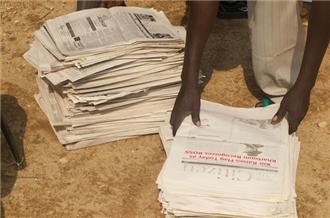Rights bodies accuse S. Sudan security of harassing journalists
August 1, 2014 (JUBA) – Two leading human rights entities have accused South Sudan’s National Security Service (NSS) of unlawfully detaining journalists, as well as seizing and shutting down newspapers in the country.

“The government clampdown takes place at a time when South Sudan most needs independent voices to contribute to discussions about how to end the political crisis and internal armed conflict,” said Elizabeth Ashamu Deng, South Sudan researcher at Amnesty International.
“Abuses by the National Security Service, an institution that still has no law governing it, have especially contributed to a growing atmosphere of fear among journalists and human rights defenders,” she added.
The two rights bodies, in their statement, called for an end to these abuses and for South Sudan’s parliament to ensure proper oversight of the NSS, in line with international human rights law and standards.
Since December last year, the group reportedly documented unlawful restrictions on expression and the media in South Sudan.
Over the past seven months, it said, senior government officials have banned journalists from interviewing opposition leaders. Those who have done so or who have reported on human rights violations by government forces have faced intimidation.
“Authorities have also restricted reporting on the conflict, human rights violations, and debates surrounding federalism in South Sudan,” partly reads the joint statement.
Several cases of confiscation of newspapers, unlawful detention of journalists and harassments have also been cited, with the blame directed at the NSS.
“Right now, journalists and commentators cannot do their work and report freely on the ongoing conflict without fear of retribution by state security forces,” said Daniel Bekele, HRW’s Africa director.
“We’ve seen the NSS and other authorities erode freedom of expression since South Sudan’s independence through abusive practices: these should end now,” he added.
Meanwhile, the two human rights entities urged the African Union Commission of Inquiry on South Sudan to ensure that violations of freedom of expression are addressed in its research and should make recommendations on how this basic right could be better protected in South Sudan, including through institutional reform of the
NSS.
ACTIVISTS REACT
A South Sudanese civil society organization on Friday welcomed the report issued by the two human right bodies and described actions of security organs on journalists as a “wrong concept”.
“This report proof facts that has happened and must be corrected by the political leadership of the government. allowing media to operate per the existing laws is opening up room for democracy to take its cost”, Community Empowerment for Progress Organisation (CEPO) said in a statement.
“Freedom of expression and access to information are among the core indicators for measuring space for allowing democracy to take its cost. Therefore we urge parliament’s committee on information and communication to discuss this report and come out with genuine and consultative practical solutions for addressing the issue of the media”, it adds.
In July 2013, South Sudan’s national assembly successfully passed the entire media bills that only awaited the president’s ascend. Last month, however, president Salva Kiir referred the same bill back to lawmakers raising fears of possible delays its eventual passing.
(ST)
